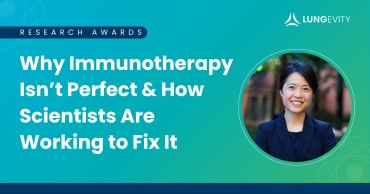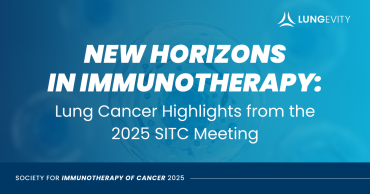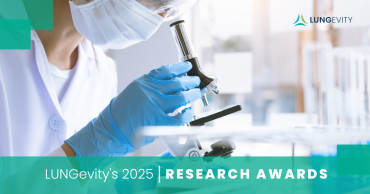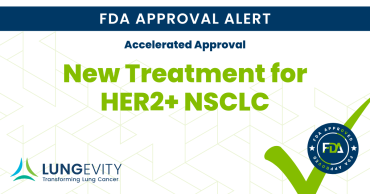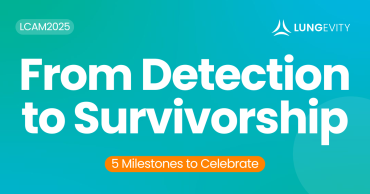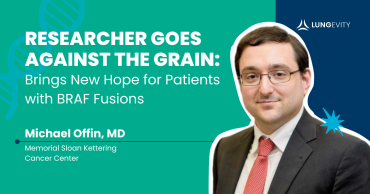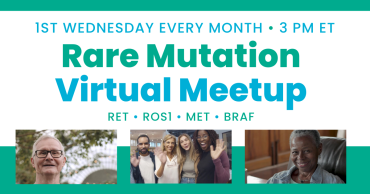-
Artificial Intelligence in Lung Cancer: Hope vs. Hype
Artificial intelligence (AI) is rapidly reshaping the future of cancer care, but such dramatic innovation also brings important questions.
AI has evolved from early consumer tools (like autocorrect on...
IN THE SPOTLIGHT
-
Why Immunotherapy Isn’t Perfect & How Scientists Are Working to Fix It
The human immune system is an intricate web of checks and balances that usually excels at detecting and destroying foreign invaders, such as bacteria and viruses, while protecting... -
New Horizons in Immunotherapy: Lung Cancer Highlights from the 2025 SITC Meeting
The Society for Immunotherapy of Cancer (SITC) celebrated their 40th anniversary at their annual meeting in National Harbor, Maryland from November 5-9, 2025. The meeting focused... -
Biggest News from Berlin: Research Highlights from ESMO
Lung cancer research was in the spotlight at the European Society for Medical Oncology (ESMO) meeting held October 17-21, 2025, in Berlin, Germany. With approximately 30,000... -
The Future of Lung Cancer Starts Here
For more than two decades, LUNGevity Foundation has been a leader in advancing lung cancer research. Since 2002, we have invested $55+ million in more than 200 research projects... -
LUNGevity Foundation Invests $1.2 Million to Fuel Next Generation of Lung Cancer Research
LUNGevity Foundation announced $1.2 million in research awards that are designed to strengthen the lung cancer workforce and accelerate progress across the lung cancer continuum... -
New Accelerated Approval for HER2-positive NSCLC
On November 19, 2025, the US Food and Drug Administration (FDA) announced the accelerated approval of sevabertinib (Hyrnuo®) to treat patients with locally-advanced or metastatic... -
Celebrating Progress in Lung Cancer: From Detection to Survivorship
Over the past twenty years, lung cancer research and care have entered a new era. One filled with hope, innovation, and progress that is transforming what it means to face a lung... -
Researcher Goes Against the Grain: Brings New Hope for Patients with BRAF Fusions
BRAF is an important signaling protein that regulates how normal cells grow and multiply through the MAPK (mitogen activated protein kinase) signaling pathway. However, changes in... -
Rare Mutations (RET, ROS1, MET, BRAF) Virtual Meetup
Rare Mutation (RET, ROS1, MET, BRAF) patients/survivors - Join us the 1st Wednesday of every month to c onnect with others who share common experiences and build your community...
Artificial Intelligence in Lung Cancer: Hope vs. Hype
Artificial Intelligence in Lung Cancer: Hope vs. Hype
Artificial intelligence (AI) is rapidly reshaping the future of cancer care, but such dramatic innovation also brings important questions.AI has evolved from early consumer tools (like autocorrect on phones, customer service chatbots, and personalized shopping recommendations) to advanced systems with the potential to revolutionize biomedical discovery and patient care. While there is tremendous excitement around AI, there is also a critical need to use it responsibly.Researchers are actively…
Why Immunotherapy Isn’t Perfect & How Scientists Are Working to Fix It
Why Immunotherapy Isn’t Perfect & How Scientists Are Working to Fix It
The human immune system is an intricate web of checks and balances that usually excels at detecting and destroying foreign invaders, such as bacteria and viruses, while protecting healthy tissue. But sometimes, the checks and balances get confused and stop the immune system from doing what’s right—such as killing tumor cells. Tumor cells are good at confusing the immune system because they originate from our healthy cells. They can often avoid detection by immune cells. Through several…
Biggest News from Berlin: Research Highlights from ESMO
Biggest News from Berlin: Research Highlights from ESMO
Lung cancer research was in the spotlight at the European Society for Medical Oncology (ESMO) meeting held October 17-21, 2025, in Berlin, Germany. With approximately 30,000 attendees from over 100 countries, this meeting gathered an international audience of clinicians, researchers, patient advocates, and representatives from the healthcare industry to discuss cutting-edge cancer research and share practice-changing clinical trial data. We saw data from studies that aim to build upon…
New Accelerated Approval for HER2-positive NSCLC
New Accelerated Approval for HER2-positive NSCLC
On November 19, 2025, the US Food and Drug Administration (FDA) announced the accelerated approval of sevabertinib (Hyrnuo®) to treat patients with locally-advanced or metastatic non-small cell lung cancer (NSCLC) with specific mutations in the HER2 gene. This approval is for patients who have been previously treated with HER2-targeted therapies, as well as patients who have received previous treatment that did not target HER2.Mutations in the HER2 gene (also called the ERBB2 gene) are…
New Insights in Treating Metastatic Lung Cancer from WCLC 2025
New Insights in Treating Metastatic Lung Cancer from WCLC 2025
For people with advanced or metastatic non-small cell lung cancer (NSCLC), the treatment landscape has changed dramatically in recent years. Researchers are learning how to optimize existing therapies and are exploring entirely new treatment approaches. At the 2025 World Conference on Lung Cancer (WCLC), several studies highlighted progress in treating newly diagnosed individuals as well as those who need new options after standard therapies stop working. Combining Chemotherapy and…
First Oral Targeted Therapy Approved for Advanced HER2+ NSCLC
First Oral Targeted Therapy Approved for Advanced HER2+ NSCLC
On August 8, 2025, the US Food and Drug Administration (FDA) announced the accelerated approval of zongertinib (Hernexeos®) to treat patients with unresectable or metastatic non-small cell lung cancer (NSCLC) with mutations in the HER2 gene. This approval is for patients who have been previously treated with a systemic therapy (such as chemotherapy). Mutations in the HER2 gene (also called the ERBB2 gene) are responsible for approximately 2-3% of nonsquamous NSCLCs. These mutations…
Taletrectinib Approved for Locally Advanced and Metastatic NSCLC with ROS1 Rearrangements
Taletrectinib Approved for Locally Advanced and Metastatic NSCLC with ROS1 Rearrangements
On June 11, 2025, the US Food and Drug Administration (FDA) announced the approval of taletrectinib (Ibtrozi™) to treat patients with locally advanced or metastatic non-small cell lung cancer (NSCLC) with ROS1 rearrangements. Taletrectinib is a next-generation, highly specific kinase inhibitor of ROS1 that was designed to treat ROS1+ NSCLC in patients whose tumors have developed drug resistance to previous targeted therapies as well as a first treatment option for newly diagnosed patients…
Surviving LMD: Michelle Never Settled for “No”
Surviving LMD: Michelle Never Settled for “No”
Michelle knew what was wrong. She knew the headaches, regular vomiting, ear popping, and “whooshing” sounds in her head were all signs of leptomeningeal disease (LMD). The issue, however, is that LMD is so rare—only diagnosed in 5% of people with cancer—she had to advocate for the testing to prove it.“I called my clinic and said I needed a brain MRI because I think I have LMD. They didn’t want to schedule one, so I said, tell my doctor I’m demanding a brain MRI. I can tell him directly if I…
New Treatment Approved for NSCLC with High Level of c-Met Protein
New Treatment Approved for NSCLC with High Level of c-Met Protein
On May 14, 2025, the US Food and Drug Administration (FDA) announced the approval of telisotuzumab vedotin-tllv (EMRELIS™) to treat patients with locally advanced or metastatic non-small cell lung cancer (NSCLC) with high levels of c-Met protein who have been previously treated with a systemic therapy, such as immunotherapy or chemotherapy. This ADC, or antibody-drug conjugate, is the first approval of its kind. This ADC treatment is designed with two key elements. One part of the…
The Promise of PROTACs for Treating RET+ Lung Cancer
The Promise of PROTACs for Treating RET+ Lung Cancer
RET proteins are a type of receptor tyrosine kinase—an important group of signaling molecules in healthy cells. When RET proteins are turned “on” and “off” in healthy cells, they control the function of other proteins. This cascading effect allows the cells to manage important cellular functions such as cell growth through protein signaling pathways. When specific changes (such as mutations or fusions) occur in RET proteins, they can become hyperactive, disrupting many important…
What Are Antibody-Drug Conjugates and How Do They Treat Lung Cancer?
What Are Antibody-Drug Conjugates and How Do They Treat Lung Cancer?
Historically, approaches to treating lung cancer included surgery, radiation, and chemotherapy. The past decade ushered in a new era of treatments with targeted therapy and immunotherapy. Now, we are seeing the emergence of another class of lung cancer treatments called antibody-drug conjugates (ADCs), that are a combination of targeted therapy and chemotherapy.ADCs act like a “smart chemotherapy” that aim to deliver the drug compound directly to cancer cells, reducing harm to healthy tissue.As…
Integrative Oncology and Lung Cancer: Adding Complementary Therapy
Integrative Oncology and Lung Cancer: Adding Complementary Therapy
What Is Integrative Oncology? Integrative oncology is the use of complementary therapies alongside conventional lung cancer treatments like chemotherapy, targeted therapy, surgery, or immunotherapy. Integrative oncology—also called integrative medicine—is an evidence-informed whole-body approach to health. It is often used to address symptoms and side effects caused by disease or treatment and improve overall quality of life. Specific examples of integrative oncology for lung cancer…
What Should Patients Know About Lung Cancer Surgery?
What Should Patients Know About Lung Cancer Surgery?
Surgery is a treatment option for early-stage lung cancer that involves removing all or part of a lung to treat a cancerous tumor. It is primarily an option for people with non-small cell lung cancer (NSCLC) staged at I, II, or IIIA. Surgery is rarely considered for tumors at stage IIIB or IV because those lung cancers have spread to other parts of the body. It is also rarely used to treat small cell lung cancer (SCLC) because SCLC is typically diagnosed at a later stage. Types of…
RET-Positive Lung Cancer: New Treatments and Beyond
RET-Positive Lung Cancer: New Treatments and Beyond
The four-person panel, including John Heymach, MD, PhD, from MD Anderson Cancer Center, discuss the current FDA-approved targeted treatments for RET-positive lung cancer—selpercatinib (Retevmo) and pralsetinib (Gavreto). While these first-line treatments have proven helpful in treating RET-positive non-small cell lung cancer, the cancer cells can eventually become resistant to the treatment, which is guiding much of Dr. Heymach’s attention at the moment.Watch the full video to hear about:Dr.…
Real-World Examples of Patient Involvement in Designing Clinical Trials
Real-World Examples of Patient Involvement in Designing Clinical Trials
Read time: 2 minutes.Here we present the final video in our three-part series about how patients and researchers can work together to develop clinical trials. In the video below, LUNGevity again partnered with Rising Tide for Clinical Cancer Research to illustrate the power of having patients contribute to the research process. We use a real-world example to learn about patient-researcher collaborations through the POSITIVE study, a breast cancer-focused clinical trial. You can…
Developing Clinical Trials that Account for the Realities of Patient Life
Developing Clinical Trials that Account for the Realities of Patient Life
Read time: 2 minutes. We are pleased to continue our three-part series about how patients and researchers can work together to develop clinical trials. In this second video, LUNGevity again partnered with Rising Tide for Clinical Cancer Research to show how researchers and patient advocates can be empowered with tools to create clinical trials that resonate with patients and address the key issues they care about. If you missed the first video, How Can Patients…
The 5 Most Popular Lung Cancer Blogs From 2024
The 5 Most Popular Lung Cancer Blogs From 2024
Read time: 3 minutes. Throughout 2024 we published blogs sharing scientific meeting recaps, educational content, personal stories, treatment news, and so much more. Below are the most popular articles we published in 2024. If you’re looking for survivor features and personal stories, you can see all the lung cancer survivors we highlighted in 2024 right here. 2024 ASCO: Highlights of Lung Cancer Research In June, we recapped the annual American Society of…
Brain Mets Basics for NSCLC: What Are Brain Metastases and How Do We Treat Them?
Brain Mets Basics for NSCLC: What Are Brain Metastases and How Do We Treat Them?
Read time: 2 minutes. Brain metastases (also called brain mets) develop when cancer from somewhere else in the body spreads to the brain. Over time, tumors can become metastatic (travel to other parts of the body). When lung cancer travels to the brain, it requires specialized treatments that can cross the blood-brain barrier. The blood-brain barrier is a tight network of blood vessels and tissue that allows some substances, such as oxygen and water, into the brain while…
Screening and Early Detection of Lung Cancer: Highlights from WCLC and ESMO 2024
Screening and Early Detection of Lung Cancer: Highlights from WCLC and ESMO 2024
Lung cancer screening and early detection were major topics of discussion at the World Conference on Lung Cancer (WCLC), held in San Diego from September 7-10, and the European Society for Medical Oncology (ESMO) conference in Barcelona from September 13-17. This fourth and final blog in our series of updates summarizes highlights from these discussions. You can read the other update blogs from these fall science meetings: Metastatic NSCLC Highlights Small Cell Lung Cancer…
How Do Drugs Get Approved (and Fast-Tracked) by the FDA?
How Do Drugs Get Approved (and Fast-Tracked) by the FDA?
Read time: 5 minutes. This is Part 3 in our series on how drugs get approved to treat lung cancer. Part 1: Understanding Clinical Trials - Why Are They Important for Drug Development? Part 2: How We Define Success for a Clinical Trial The United States federal government aims to regulate prescription drugs to ensure people are receiving medication that’s safe and effective. Every prescribed drug in the U.S. has gone through a rigorous testing process that can…
How We Define Success for a Clinical Trial
How We Define Success for a Clinical Trial
Read time: 6 minutes. This is Part 2 of 3 in our series on how drugs get approved to treat lung cancer. Make sure to read Part 1 on the phases of clinical trials and why they are important for new drug development. We all want a treatment for lung cancer that is completely safe and entirely effective. While researchers are working toward that goal, the reality is we aren’t there yet. Every treatment we are considering comes with potential benefits and side effects. The…
Understanding Clinical Trials: Why Are They Important for Drug Development?
Understanding Clinical Trials: Why Are They Important for Drug Development?
Read time: 3 minutes.This is Part 1 in a 3-part series explaining how new drugs and treatments get approved to treat lung cancer. Parts 2 and 3 will be published in the coming weeks.Have you ever wondered how a new medicine or drug to treat lung cancer is brought to the people who need it? That’s what clinical trials help us do.According to the National Cancer Institute, a clinical trial is a type of research study that tests how well new medical approaches (such as screening tests, prevention…
HER2+ NSCLC: Understanding the Latest Treatment and Advances
HER2+ NSCLC: Understanding the Latest Treatment and Advances
Many people have heard of HER2-positive breast cancer. But HER2 is an important biomarker found in many different types of cancer—including non-small cell lung cancer (NSCLC). A lot is known about how to treat HER2 in breast cancer, and researchers are leveraging that knowledge to bring treatment options to people living with HER2-positive NSCLC. In the video below, Dr. Ibiayi Dagogo-Jack, assistant professor of Medicine at Harvard Medical School and thoracic oncologist at…
Countdown to ILCSC24: Bringing the World’s Experts Right to Your Living Room
Countdown to ILCSC24: Bringing the World’s Experts Right to Your Living Room
Read time: 3 minutes. One of LUNGevity’s two flagship survivorship events, the International Lung Cancer Survivorship Conference (ILCSC), is being held virtually September 20 – 21, 2024. This is a free, online event that allows people with lung cancer and caregivers from around the world to join from the comfort of their own homes and hear from a star-studded lineup of lung cancer experts discussing the latest advances in research and treatment. You can register today for…
How Can Patients and Researchers Design Clinical Trials Together?
How Can Patients and Researchers Design Clinical Trials Together?
Read time: 2 minutes. Traditionally, people associate getting involved in lung cancer research with enrolling in a clinical trial. But most don’t realize they can also partner with researchers behind the scenes and get involved in designing clinical trials. In the first of a three-part series, Rising Tide Foundation for Clinical Cancer Research has partnered with LUNGevity to understand the role people with lung cancer can play in developing clinical trials. Through panelist…
Repotrectinib Approvals Expand to Include Patients with NTRK+ Solid Tumors
Repotrectinib Approvals Expand to Include Patients with NTRK+ Solid Tumors
On June 13, 2024, the US Food and Drug Administration (FDA) announced the accelerated approval of repotrectinib (Augtyro™) to treat patients with advanced NTRK-positive solid tumors who have either had their disease recur or who don’t have alternative treatment options. This treatment is part of a growing trend of tissue-agnostic drugs—treatments that are prescribed based on the biomarkers found in the tumor rather than the organ where the cancer originated. It is available to…
Safely Bring Yoga, Dietary Supplements, Exercise, and More into Your Lung Cancer Journey
Safely Bring Yoga, Dietary Supplements, Exercise, and More into Your Lung Cancer Journey
Read time: 2 minutesIntegrative oncology adds holistic approaches—such as acupuncture, nutrition, exercise, and mindfulness—into a treatment plan. Research shows these interventions can have a tremendous impact on people going through lung cancer treatment and their quality of life. Unfortunately, they are also topics riddled with myths and falsehoods. LUNGevity spoke to an expert to help sort out the facts from the fiction. In the webinar below, Gabriel Lopez, MD, medical director of…
Chemo Shortage Didn’t Materialize ‘The Way We Initially Feared’
Chemo Shortage Didn’t Materialize ‘The Way We Initially Feared’
This March, LUNGevity Foundation partnered with CURE for their “Speaking Out” video series, inviting Amy Moore, PhD, vice president of global engagement and patient partnerships at LUNGevity Foundation, to discuss recent chemotherapy shortages. During the interview, Dr. Moore addressed the critical issues posed by the chemotherapy shortage, offering valuable insights into its origins, impact on people with lung cancer, available alternatives, and ongoing efforts to address disparities. Her…
FDA Grants Accelerated Approval for HER2+ Cancer Treatment
FDA Grants Accelerated Approval for HER2+ Cancer Treatment
On April 5, 2024, the US Food and Drug Administration (FDA) announced the accelerated approval of fam-trastuzumab deruxtecan-nxki (Enhertu®) to treat patients with unresectable or metastatic HER2-positive solid tumors.This treatment is part of a growing trend of tissue-agnostic drugs -- treatments that are prescribed based on the biomarkers found in the tumor rather than the organ where the cancer originated. It is available to patients through the FDA’s accelerated approval process,…
Lung Cancer Masterclass: Get Smart About Lung Cancer
Lung Cancer Masterclass: Get Smart About Lung Cancer
In the past five years, the lung cancer community has seen an astonishing number of new treatments. As our understanding of lung cancer has deepened, the older treatment approaches have also become more effective and efficient. These options are fantastic steps toward improving the overall survival and quality of life for people living with lung cancer, but it can be difficult for patients and caregivers to keep track of the new drug treatments and scientific advancements. …


